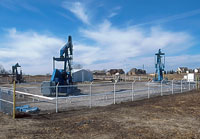Only a few things really get Americans to sit up and pay attention. Oprah’s weight. Ally’s hair. And a rise in the price of gasoline.
The latter, coupled with lucrative campaign contributions from the energy industry, is why President Bush and Vice President Dick Cheney thought that an energy plan based on new drilling from the coast of Alaska to the coast of Florida would be politically popular.
What the Bush administration did not anticipate is an encouraging 21st-century trend that is fracturing the Republican Party’s right wing. Americans understand that safeguarding natural assets, not exploiting them, is the new raw material of the country’s economic competitiveness. Most people, even Republican voters, don’t want their coasts and wilderness regions invaded by drilling platforms, regardless of the price of gasoline.
To get an idea of how vulnerable the Republican right is on its production-based energy plan, and how much turmoil it is causing within the party’s ranks, come to the magnificent forested northern shores of the Great Lakes.

Oil and trouble along the
shore in Manistee County, Mich.
Photo: MLUI/Patrick Owen.
In February, just weeks after President Bush was inaugurated, aides to Michigan’s conservative Republican Gov. John Engler announced they were taking steps to end a three-year-old moratorium and issue new permits to drill for oil and gas beneath the Great Lakes. Since the 1970s, the state has approved 10 wells along the shoreline of Lake Michigan and three more along the coast of Lake Huron. Six wells are still operating along Lake Michigan and one along Lake Huron.
Oil and gas is tapped from rigs set on the shoreline and slant drilled to reach reservoirs some 4,000 feet beneath the bottom of the Great Lakes and up to two or three miles offshore. Engler temporarily halted coastal drilling in Michigan in 1998 after a public outcry over his administration’s decision to issue two drilling permits to a Canadian company to tap reserves off the northern shore of Lake Michigan around Manistee.
His administration’s February announcement prompted similar public opposition, which has only mounted in the months since then. Democrats have seized on the issue as a way to focus public attention on what they view as the development-at-any-cost environmental policies of Engler and the Republican right. Engler and his supporters in the oil and gas industry have returned fire by asserting that slant drilling beneath the Great Lakes is safe and that Democrats are misleading the public about the threat.
Peter Out
At the moment the advantage is with the Democrats, a political reality that is putting enormous pressure on Republican leaders. Rep. Peter Hoekstra, for example, is a Republican from Holland, Mich., who long ago embraced his party’s governing values of deregulating industry, lowering taxes, reforming welfare, supporting school vouchers, and opposing gun control and abortion. He, no surprise, also has one of the worst environmental voting records in Congress.

A drill-free stretch in Ludington State Park.
Photo: MLUI/Patrick Owen.
But earlier this month, Hoekstra startled the governor and surprised his allies in industry by sounding like someone he’d never been: a conservation-minded moderate. During a news conference in his district, which hugs the eastern shoreline of Lake Michigan, Hoekstra announced he not only opposed Engler’s plan to drill beneath the Great Lakes, but also would support a bill introduced by liberal Michigan Democratic Sen. Debbie Stabenow to halt Great Lakes drilling pending an environmental study by the National Academy of Sciences.
“[The Great Lakes] really are a very, very unique resource,” Hoekstra told reporters, “and we have to be especially careful with them.”
He punctuated this point yesterday when he joined 69 other Republican House members in support of a measure sponsored by Michigan Rep. David Bonior, a Democratic gubernatorial candidate, to give the U.S. Army Corps of Engineers oversight of Great Lakes drilling. The measure, which passed overwhelmingly, is intended to give the federal government authority superior to the state’s and ban energy development along the Great Lakes coastline. If the language is approved by the Senate, it will set up an intriguing battle over states rights.
In Lansing, the state capital, the governor and his senior aides publicly have said Hoekstra’s defection was no big deal. “I think it’s his right to take that position,” said Susan Shafer, Engler’s press secretary. “As Republicans, we probably agree on 99 percent of the issues, but there are going to be times when people are going to vary.”
Privately, though, Republican state leaders are deeply divided and worried. Never during Engler’s 10 years in office has an environmental issue gained such prominence, or become so divisive. Still, Engler, like Bush and his drilling plans, seems determined to open the shoreline to new drilling.
Drills and Chills
With each legislative vote and agency decision that promotes that goal, the governor and his aides are solidifying coastal energy development as a top-tier political issue that is almost certain to affect the 2002 Michigan gubernatorial campaign, and may well alter state House, Senate, and congressional races as well.

Directional-drilling on Lake Michigan’s
shore.
Photo: MLUI/Patrick Owen.
Mindy Koch, chief of the forest, mineral, and fire management division at the state Department of Natural Resources, said the administration’s goal is to begin leasing Great Lakes bottomlands for energy development next spring and drilling would resume shortly afterwards. That schedule would put the issue squarely before voters in the middle of what is expected to be a very competitive race for governor.
Engler has gamely tried to hold his party together. In early June, the Republican-controlled state Senate, on a party-line vote, approved a bill to allow directional drilling beneath the Great Lakes with certain stipulations.
But some Republican lawmakers in the state House are nervous about the political implications. Rep. Scott Shackleton, a Republican of Sault Ste. Marie, publicly announced his opposition to the Senate measure and more of his G.O.P. House colleagues followed. By late June, a House-Senate conference committee killed the Senate bill.
The drilling debate is also producing odd and embarrassing political moments for conservatives. For instance, the city council in Grand Haven, which lies along Lake Michigan, passed an ordinance in mid-June to ban directional drilling within city boundaries. Republican state Sen. Leon Stille, who represents the city, promptly retaliated on the oil industry’s behalf by proposing a bill that would prevent cities that ban directional drilling from receiving revenues from the Natural Resources Trust Fund. The trust fund is a state-managed account derived from oil and gas royalties and used to purchase open space and recreational lands. The bill was condemned by newspaper editorialists who noted that Stille was a conservative who campaigned on the Republican principle of upholding the authority of “local control.”
Science Fiction
That is not the only conservative governing principle that is being pulverized by the plan to drill along the Great Lakes coast. Another is “sound science.” Engler and his senior environmental aides have consistently argued during the past decade that far-reaching decisions about Michigan’s environment and public health mus
t be based on the best available scientific data. But when it comes to drilling for gas and oil beneath the lakes, Engler has not only abandoned the “sound science” principle, he has unwittingly snared himself in an untenable double-standard that public opinion polls show residents are rejecting.

Dune hasn’t yet felt Engler’s sting.
Photo: MLUI/Patrick Owen.
Here’s how this happened: In 1997, when Newstar Energy, a Canadian company, proposed to tap new reserves of oil beneath Lake Michigan and the issue first came to public attention, Engler appointed a panel of top scientists to the Michigan Environmental Science Board to study the potential risks.
In October of that year, the Science Board published a report that found that the risk of oil or gas leaking into the Great Lakes directly from deep wells was low. The panel concluded, though, that state policy was not nearly rigorous enough to protect one of the world’s superb scenic coasts from the harm onshore associated with new wells, roads, pipelines, and processing stations. The panel laid out specific directives to protect the coast line before any drilling could occur.
Among the recommendations was bringing together local leaders, concerned citizens, state officials, and the industry to establish an energy development plan that protected the coast and communities while enabling the industry to efficiently develop oil and gas reserves. The Science Board also recommended that any new drilling use existing wells, roads, and other infrastructure, and not cause new damage along the coast.
At the time, the governor and many conservationists hailed the Science Board’s findings as forward-thinking and reasonable. In a joint press release the two state environmental agencies said, “The state will move swiftly to implement the science panel’s key recommendation.”
But rather than following through with these recommendations, Engler is selectively choosing to apply only a few, especially the easy ones like mandating that any new wells be at least 1,500 feet from the shoreline. The tougher recommendations, such as appointing a coastal energy development planning panel that includes citizens and local governments, have been ignored. Russell Harding, the director of the state Department of Environmental Quality, said the Engler administration rejects that recommendation because it would give local governments “veto power.”
Sleazy Money
The administration publicly says it is pursuing new coastal drilling for two reasons: Oil and gas development will produce new jobs in the industry, and the nation needs the fuel. “We still have a tremendous need for energy and we have to tap available resources,” Ken Silfven, the press secretary at the DEQ, told the Washington Post.
But another key factor is campaign cash. Michigan’s oil and gas industry is among the leading contributors to the governor and other conservative Republicans. According to state campaign finance records, from 1990 to 1998, Engler received $383,400 from the state oil and gas industry, more than from almost any other industry. From 1994 to 1998, the industry contributed $1.5 million to state candidates; 60 percent went to Republicans.
The energy industry has benefited handsomely from its investment. In 1995, Engler intervened unexpectedly and privately settled a long-running “takings” case that involved banning energy development in a Lake Michigan coastal wilderness. The disputed settlement, which occurred before the state Supreme Court had an opportunity to fully consider the case, paid $94.8 million in taxpayer funds to a small group of oil companies and mineral owners. All of the oil company executives were important Republican donors.
Two years earlier, in 1993, the Engler administration privately negotiated an agreement with natural gas companies operating on state lands that allowed drillers to write off all of their production costs before they paid state royalties. The agreement, which was never brought to the attention of the legislature, drained at least $8 million a year from the Natural Resources Trust Fund. When it was discovered and publicly disclosed in 1995, the agreement was rescinded and millions of dollar unlawfully diverted from the public treasury were recovered.


